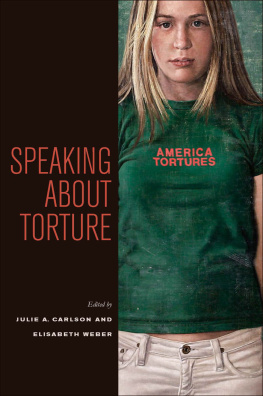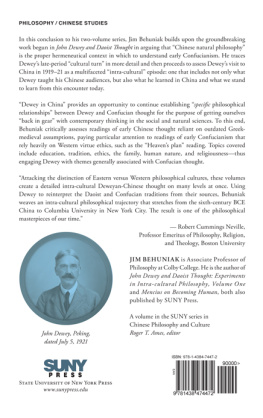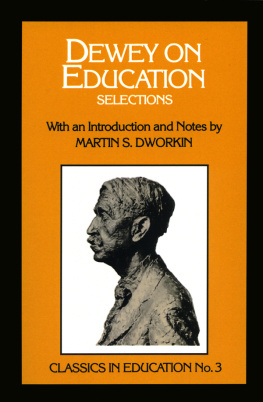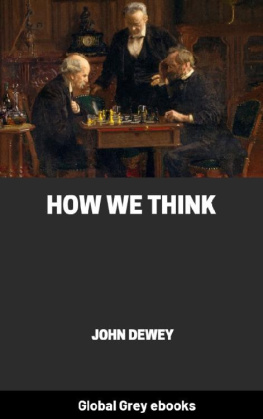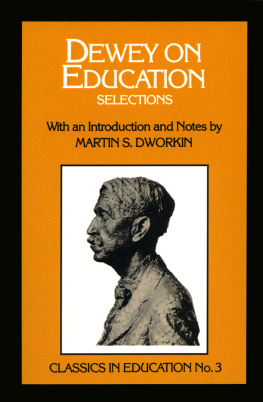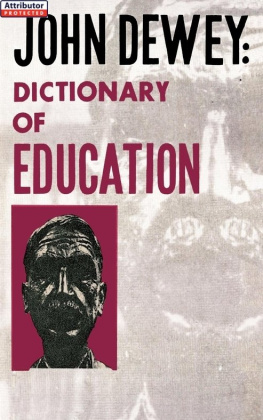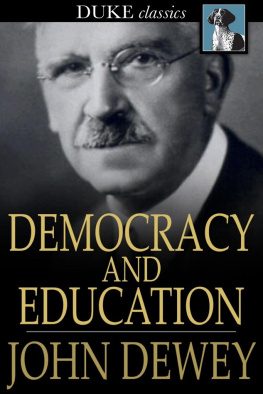P rogressive M useum P ractice
To Vito Perrone (19332011)
In Deweys terms, we need to see education as a critical path to imaginationthat distinctively human capacity to envision a world of greater potential. Because inequities have existed for so long doesnt mean they cant be moderated, even eliminated.
Vito Perrone (1998)
P rogressive M useum P ractice
J ohn Dewey and Democracy
G eorge E. Hein
First published 2012 by Left Coast Press, Inc.
Published 2016 by Routledge
2 Park Square, Milton Park, Abingdon, Oxon OX14 4RN
711 Third Avenue, New York, NY 10017, USA
Routledge is an imprint of the Taylor & Francis Group, an informa business
Copyright 2012 Taylor & Francis
All rights reserved. No part of this book may be reprinted or reproduced or utilised in any form or by any electronic, mechanical, or other means, now known or hereafter invented, including photocopying and recording, or in any information storage or retrieval system, without permission in writing from the publishers.
Notice:
Product or corporate names may be trademarks or registered trademarks, and are used only for identification and explanation without intent to infringe.
Library of Congress Cataloging-in-Publication Data
Hein, George E., 1932-
Progressive museum practice : John Dewey and democracy / George E. Hein.
p. cm.
Includes bibliographical references and index.
ISBN 978-1-59874-480-4 (hardback : alk. paper)ISBN 978-1-59874-481-1 (pbk. : alk. paper)ISBN 978-1-61132-590-4 (consumer ebook)ISBN 978-1-61132-787-8 (institutional ebook)
1. MuseumsEducational aspects. 2. Dewey, John, 18591952. 3. Democracy and education. 4. EducationPhilosophy. I. Title.
AM7.H444 2012
069.15dc23
2012012228
ISBN 978-1-59874-480-4 hardcover
ISBN 978-1-59874-481-1 paperback
I owe a debt to many institutions, colleagues, and friends who have provided support, guidance, and advice while I was working on this book.
I am grateful to the Smithsonian Institutions Center for Education and Museum Studies for a 20092010 Fellowship in Museum Studies and to the Getty Research Center for their Fellowship as a Museum Guest Scholar in Education, JanuaryMarch 2011. Both host institutions provided me with generous support, time to concentrate on this work, and an invaluable opportunity to meet regularly with colleagues. I wish to thank librarians at these institutions and at Lesley University who have always provided able assistance in finding needed materials. I owe special thanks to Ryan Lieu, my research assistant at the Getty Research Institute, for his enthusiasm as well as his good work.
Derek Gillman, executive director of the Barnes Foundation, generously offered me access to the collection of the Dewey-Barnes correspondence. Thanks especially to archivists Katy Rawdon Faucett and Barbara Beaucar for their hospitality in cramped quarters and also for their willingness to respond to my repeated queries.
Our Dewey reading group at Technical Education Research Centers (TERC) has contributed enormously to my understanding of Deweys work and, particularly, to its relevance to our lives today. Special thanks to the long-time regular members, Brian Drayton, Gilly Puttick, and Paul Wagoner.
Many individuals have provided ideas, clarified concepts, and read chapters critically. Those who have commented on individual chapters or whole sections include Leslie Bedford, Sara Burke, Desmond Griffin, Brenda Engel, Laura Hein, Ruth Hein, Elliott Kai-Kee, Dorothy Miller, Robert Rosenthal, and Judy White.
Gordon Harper has provided special assistance as well as encouragement for several years. Sonal Jhavarti patiently edited my drafts. Mitch Allen of Left Coast Press, Inc., was enthusiastic from the beginning and patient as I took more time than expected. Stefania Van Dyke, from Left Coast Press, Inc., has also provided thoughtful editorial assistance.
Mary Alexanders continuous support as well as crucial critical comments represent another step in our long-term friendship and professional collaboration. My wife, Emily Romney, as always, has been both supportive and encouraging in more ways than I could possibly describe.
I thank them all, and many others, whose comments at lectures, in casual conversation or through my reading of their work have allowed me to understand something relevant to the book. As Dewey points out repeatedly, all our actions are influenced by the people with whom we interact. Nevertheless, I accept full responsibility for any shortcomings or errors in this volume.
Note: Some of the material in the chapters listed below appeared earlier in other publications.
Chapter 2: Hein, G. E. 2004. John Dewey and Museum Education, Curator: The Museum Journal 47[4]: 413427.
Chapter 4: Hein, G. E. 2006. Progressive Education and Museum Education: Anna Billings Gallup and Louise Connolly, Journal of Museum Education 31[3]: 161174.
Chapter 6: Hein, G. E. 2011. Deweys Debt to Barnes, Curator: The Museum Journal 54[2]: 123139.
T his book is the product of my decade-long infatuation with the work of John Dewey and my longer interest in how people learn in museums. I have been profoundly influenced by Deweys rich writings; I am enamored of how his philosophy explains the culture we live in while also providing a framework for improving society. Deweys life-long faith in democracy, and in education as the most important activity to sustain it, accords purpose to those of us who are educators. He offers the comforting notion that we can only expect incremental progress towards improving society, but can never hope to achieve perfection. His writing affirms that our efforts, though limited, are nonetheless worthwhile, as long as we strive to promote a more democratic society. In this book, I describe Deweys educational ideas and how they influence museum education: how they have done so historically, how they continue to do so, and how they might provide guidance in the future.
While researching progressive museum educators, I realized how little has been written about the history of museum education. As an established profession, museum education is less than fifty years old. Today, museums include education departments in their organizational charts, and accredited degree programs exist for this distinct profession; it has solid standing (at least to some extent) in the broader arena of museology or museum studies. As Edward Forbes, a British museum educator, said 160 years ago, museums are essentially educational institutions:
Museums, of themselves alone, are powerless to educate. But they can instruct the educated, and excite a desire for knowledge in the ignorant. On the officers in charge of the institution there consequently falls a serious responsibility. It is not sufficient that they should be well versed in the department of science, antiquities, or art committed to their charge. They may be prodigies of learning, and yet utterly unfitted for their posts. They must be men mindful of the main end and purpose in view [i.e., education]. (Forbes 1853, 345346)
My own interest, however, is not in the general history of this emerging field, but in the history of those individuals and institutions that viewed themselves as progressive museum educators.


